ARTICLE AD BOX
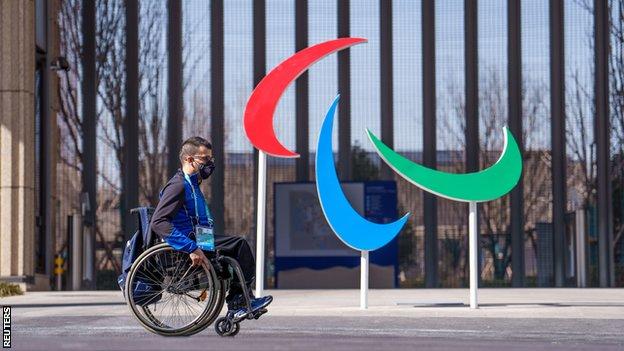 The opening ceremony of the Winter Paralympics has been eagerly anticipated
The opening ceremony of the Winter Paralympics has been eagerly anticipated| Venue: Beijing, China Dates: 4-13 March Time in Beijing: GMT +8 |
The build-up to the Beijing Winter Paralympics has been turbulent, with first the coronavirus pandemic and in recent days Russia's invasion of Ukraine casting huge shadows.
But with the Games due to officially open in the Chinese capital on Friday, the athletes now have their chance to take to the ice and snow.
The Games - the 13th edition of a Winter series that began in Ornskoldsvik in Sweden in 1976 - will feature athletes competing for 78 gold medals.
Friday's opening ceremony at the Bird's Nest Stadium will be attended by dignitaries including Chinese president Xi Jinping, the first medals will be awarded on Saturday - day one of competition - and the closing ceremony will take place on Sunday, 13 March.
What has happened so far?
There has been much focus on the International Paralympic Committee (IPC) and the presence of Russian and Belarusian athletes, after Russia's invasion of Ukraine.
The IPC committee was criticised when it initially said on Wednesday it would allow the athletes to compete as neutrals.
But less than 24 hours later, the decision was reversed, with the IPC saying the "situation in the athlete villages" was "untenable".
There were also fears the Ukraine delegation would be unable to travel.
However, the team of 20 athletes and nine guides arrived in Beijing on Wednesday. Valeriy Sushkevych, the Ukrainian Paralympic chief, said the team's presence at the Games was a "symbol that Ukraine is alive".
Previously there had been much criticism over the award of both Winter Games to China because of their alleged human rights abuses, particularly around the treatment of Uighur Muslims - a minority group which lives mostly in north-west China.
It led to many countries, including the UK, United States and Canada, declaring a diplomatic boycott of the Olympics.
But IPC president Andrew Parsons has insisted China hosting the 2008 Paralympics has led to a positive change in the way people with disabilities are perceived in the country.
China has topped the medal table at each summer Games since 2004, winning 207 medals in Tokyo - 83 more than second-placed Great Britain.
Who will be competing?
The Games will feature more than 600 athletes from 46 delegations competing in 78 medal events across six sports - alpine skiing, cross-country skiing, biathlon, Para-ice hockey, snowboard and wheelchair curling.
While the number of athletes is an increase on four years ago, there are fewer medal events - with women's snowboard losing two events because of a lack of numbers.
Azerbaijan, Israel and Puerto Rico are set to make their Winter Paralympic debuts, Liechtenstein returns for the first time since 1994, and Estonia and Latvia are back for the first time since 2002 and 2006 respectively.
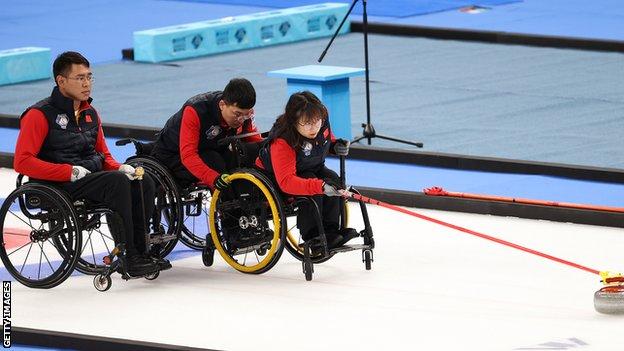 China are also world wheelchair curling champions as well as defending Paralympic champions
China are also world wheelchair curling champions as well as defending Paralympic championsFour years ago in Pyeongchang, the United States topped the medal table with 36 - including 13 golds. Russian athletes, competing under the Neutral Paralympic Athlete banner, were second, with Canada third.
China won just one gold - in the wheelchair curling - but have the biggest delegation this time with 96 athletes, plus sighted guides.
Many Chinese athletes have been training on home soil and have not competed internationally in the build-up to the Games, so they are an unknown quantity.
Where is the action happening?
Beijing is the first city to host both the Summer and Winter Games, 14 years after it hosted the 2008 summer Paralympics.
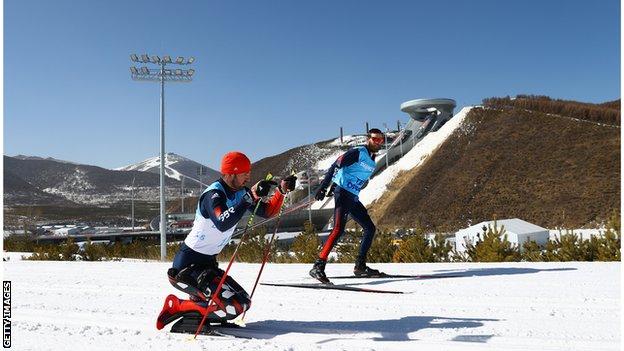 The nordic skiing events include both cross-country and biathlon
The nordic skiing events include both cross-country and biathlonThe Games take place across three clusters.
Beijing itself will host the indoor events - curling and ice hockey - as well as the opening and closing ceremonies.
Yanqing, located 75km (47 miles) out of Beijing, is the home of the alpine skiing events, while the mountains of Zhangjiakou, 180km (111 miles) away from the capital, host the snowboarding as well as biathlon and cross-country.
Many of the venues in Beijing have been repurposed from the 2008 Games, including swimming's Water Cube, which has been renovated to become the home of curling, and the Bird's Nest stadium, which will host the opening and closing ceremonies.
How will the British team fare?
The 24-strong GB team is the largest at a Winter Games since Lillehammer in 1994, with athletes competing all sports except Para-ice hockey.
Four years ago, British athletes enjoyed their most successful Winter Games, winning seven medals - all from the visually impaired athletes on the ski slopes.
As they did for the Olympics, UK Sport has set a range rather than a specific number for British medals at the Beijing Paralympics - with 5-9 the target.
Defending champion Menna Fitzpatrick, who became Britain's most successful Winter Paralympian along with guide Jen Kehoe in South Korea, is back but has a new guide in Gary Smith - a late replacement for Katie Guest.
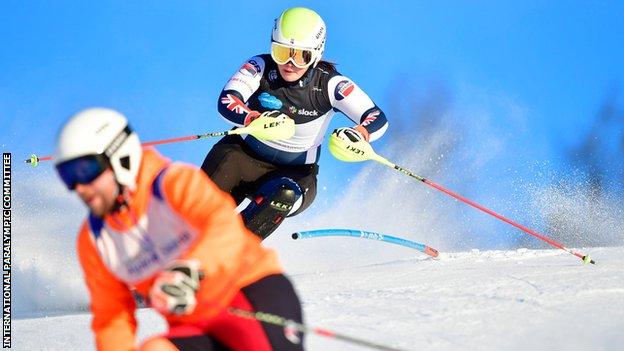 Millie Knight has recovered from multiple concussions to compete in Beijing
Millie Knight has recovered from multiple concussions to compete in BeijingMillie Knight and Brett Wild, who won two silvers and a bronze at the last Games, will also be chasing success again - and both Fitzpatrick and Knight were gold medallists at January's Para Snow Sports World Championships.
Elsewhere, snowboarder James Barnes-Miller - another world medallist having taken silver in the snowboard cross event for athletes with upper limb impairments - will be aiming to win GB's first Paralympic medal in the sport.
And Hope Gordon will create history as Britain's first female Nordic skier when she competes in the cross-country events
"This team promises to be our most competitive across a wider range of sports and events than ever before," said GB chef de mission Phil Smith.
"After what has happened in the build-up, we are ready go out and compete and focus on the athletes and sports and are looking forward to using Beijing to build on the success of the past two Paralympic Winter Games."
Who are the global stars to watch?
Given the backdrop against which they will take place, the Games are sure to emotional for Oksana Masters, who was born in Ukraine but has lived in the United States since she was seven.
Masters will compete in the biathlon and cross-country events having won two golds, two silvers and a bronze in Pyeongchang before switching to hand-cycling and winning two gold at last year's rescheduled Tokyo Games.
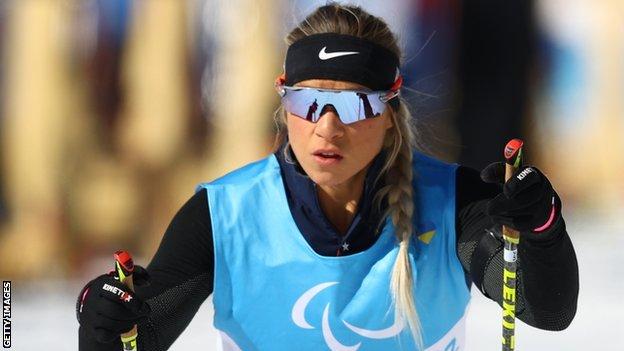 Masters sported the Ukraine flag on her competition bib during training
Masters sported the Ukraine flag on her competition bib during trainingCanadian visually impaired cross-country skier Brian McKeever has the chance to create history at what he says will be his final Paralympics.
McKeever is already the most decorated male cross-country Paralympian in history with 17 Games medals, including 13 golds, and three more wins would see him move level with former German alpine skier Gerd Schoenfelder on 16 golds overall.
In the snowboarding, Lisa Bunschoten will be hoping to carry on the tradition of her late Dutch team-mate Bibian Mentel-Spee when she lines up in the snowboard cross and banked slalom events.

- Step into the multiverse: Explore a dimension where Fergie quits Manchester United and Ronaldo joins Portsmouth
- 'Eight outstanding prison breaks': What is the greatest escape ever, according to Morgan Freeman?


 3 years ago
86
3 years ago
86
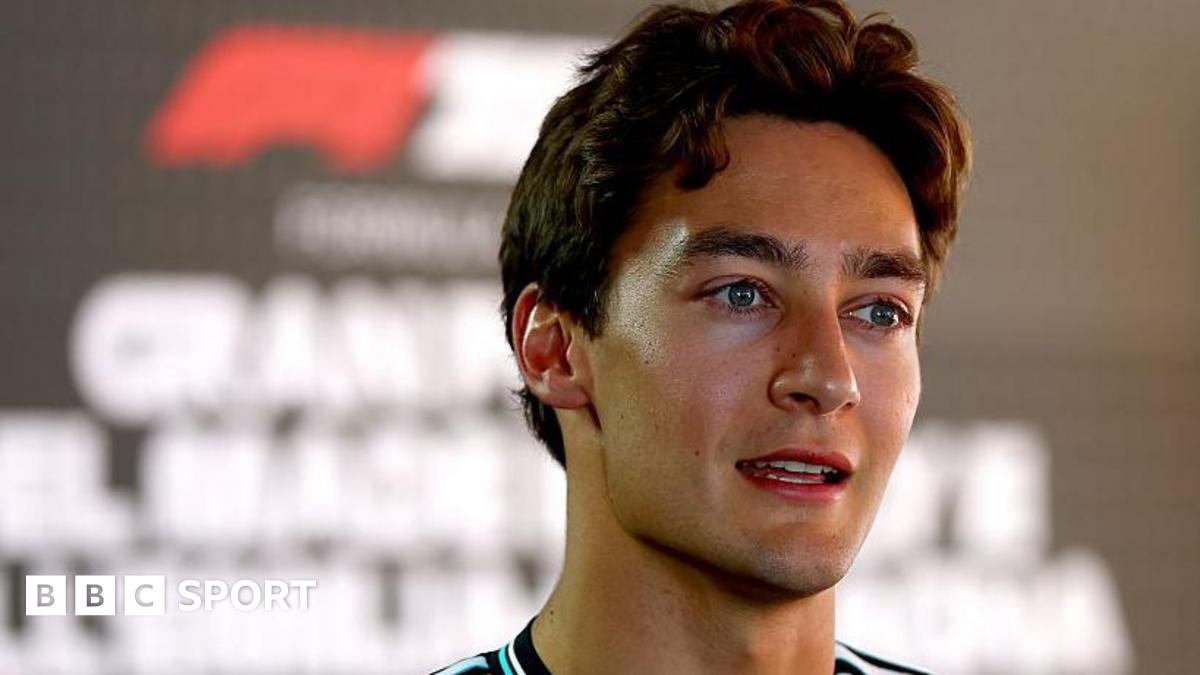

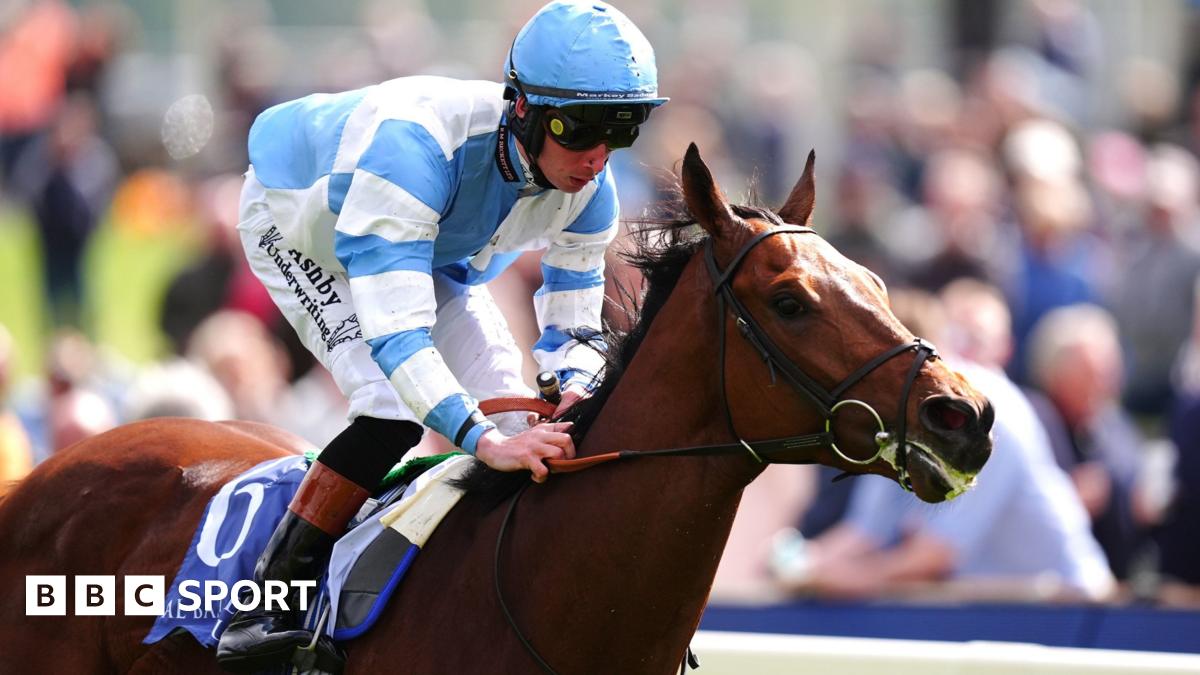





 English (US) ·
English (US) ·